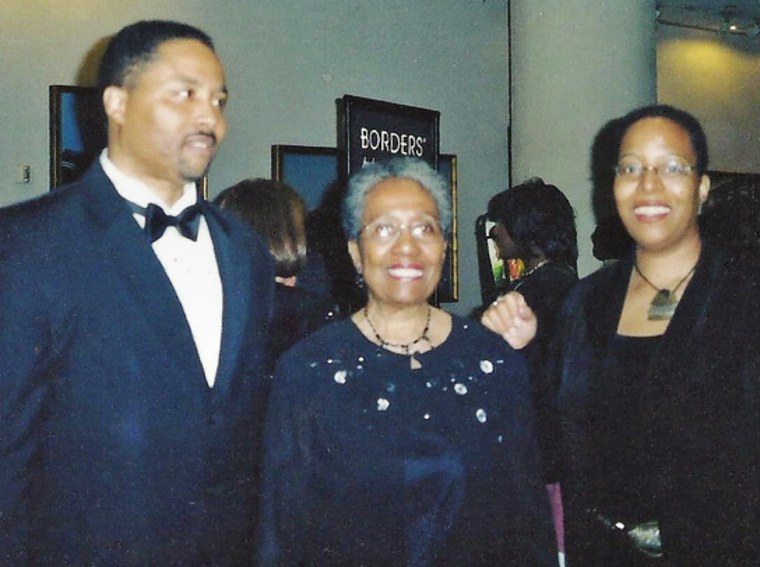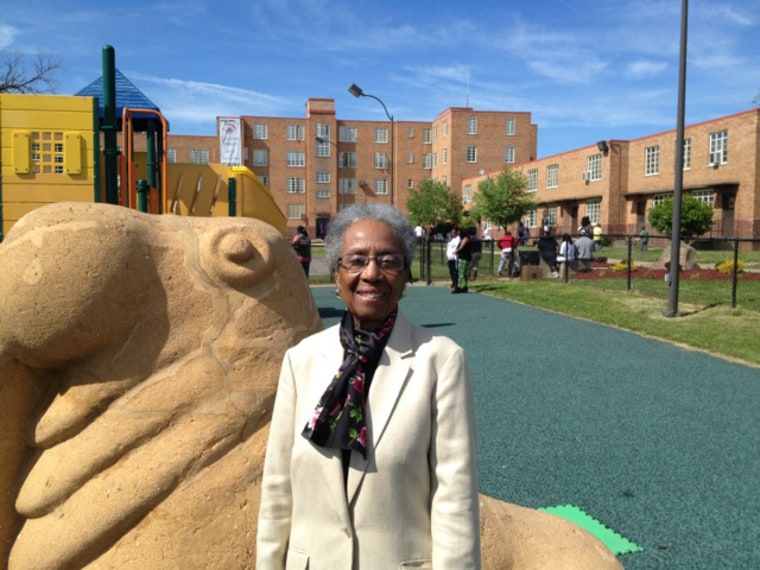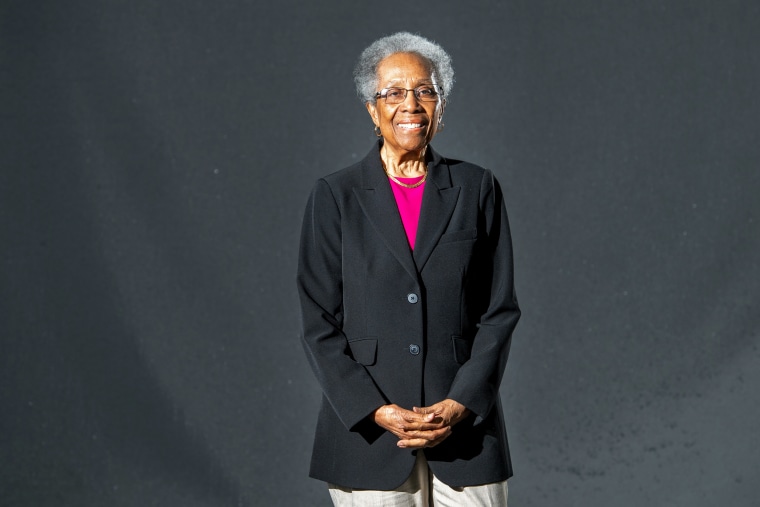When beloved children’s author Eloise Greenfield died last week in her longtime hometown of Washington, D.C., at age 92, she left a catalog of books that spanned five decades and fans who grew up reciting her poems, reading her books to their children and buying them for their grandchildren.
Her first book, “Bubbles,” was published in 1972, at a time when books featuring Black children and families were rare. She quickly rose to prominence with her lyrical creations featuring everyday folks as well as historic figures. When she was in her 80s, she once donned a white suit and apple cap in a video shot by her grandson to rap words she wrote for her young character Nathaniel, who offered his life’s philosophy in rhyme in “In the Land of Words.”
“My mom wrote from a love of craft, a love of words, and a strong sense of mission and purpose,” said her son, Steve Greenfield. “She set out to counter the blatant misrepresentation of African Americans in mainstream literature and media and to contribute to Black children, recognizing their beauty and love.”
Greenfield was blind by the time she had a fatal stroke, but her devotion to children pushed her to keep writing, with some assistance from several devices and her daughter, Monica Greenfield. In all, she wrote 48 books.
“As her vision became worse, she would dictate her thoughts and I would type them,” Monica Greenfield said.

Greenfield’s death was the third recent loss of pioneers instrumental in the creation and promotion of books for or about Black children. Bernette Ford, the first African American publisher of children’s books at a major publishing company, died of cancer on June 20. She was 70. (Her husband, George Ford, illustrated Greenfield's book about the entertainer and activist Paul Robeson.) Floyd Cooper, a celebrated illustrator of children’s books, credited Greenfield with starting his career. He died July 15 at age 65.
Greenfield insisted on having Black illustrators for her books at a time when publishers claimed they could not find any.
“Early in her career, she experienced some pushback because of this, which reinforced my understanding of our struggle against racism, and having integrity and principles,” Monica Greenfield said.
Eloise Greenfield and illustrator Jan Spivey Gilchrist worked on 29 books together over 26 years. Gilchrist was a fine artist and had never considered illustrating until Greenfield, who admired how she depicted Black people in her paintings, suggested she do so.
The first book she illustrated was one by Greenfield’s mother, Lessie Jones Little, a collection of poems titled “Children of Long Ago.” Greenfield loved Gilchrist’s work and the two became fast friends, talking five or six times a day and traveling together promoting projects.
Writers, historians and cultural gatekeepers admired Greenfield for her convictions. Her lyrical writings showed Black life in a way that had seldom been presented in print, endearing her to teachers and parents, but her insistence that Black illustrators and authors be entrusted with controlling the images of their lives made her an esteemed guardian of Black history and culture.
“We were in Little Rock, Arkansas," Gilchrist recalls. "We were on stage and there was a white woman who had done a book and it was racist. Eloise did not attack the book or the woman, but she was firm. The woman said something racist and condescending in her talk. I remember the story had one Black man in town and he saved all these white people. Eloise took the mic again after the woman finished. Everything went quiet. There were a lot of people in the room, and all of them were white except three or four.
“Eloise explained something about the character. I know she said he wasn’t very nice, that he was stupid and that wasn’t good for children. No one said a word but afterwards, the line to see her and buy her book was wrapped around the block.
“She was one of the most honest and fair people I ever met,” said Gilchrist, who added: “I’m having a difficult time with this loss. This woman never bowed. Never bowed.”
Wade and Cheryl Willis Hudson, founders of Just Us Books, started their company in 1988 because publishers wouldn’t accept their manuscripts that centered around Black children. They came to know Greenfield and witnessed her determination to provide Black literature and to support Black and independent bookstores. Wade said Greenfield was a lot like the Harriet Tubman she wrote about in a poem by that name:
Harriet Tubman didn’t take no stuff
Wasn’t scared of nothing neither
Didn’t come in this world to be no slave
And wasn’t going to stay one either
“She was one of those pioneers that were mentors, advocates and carriers of the fight for diversity," he said. "She didn’t take no stuff.”
Greenfield’s first book was published by the independent Drum and Spear Press in Washington, D.C.
“She had been sending her work to major publishing companies, but they did not respond positively,” Cheryl Wade said.
Judy Richardson, a veteran of the Student Nonviolent Coordinating Committee and a filmmaker and an educator, was the children’s editor at Drum and Spear Press when Greenfield submitted her manuscript about a little boy excited over learning his first words.
“We had a bookstore founded by SNCC folk and them we formed this offshoot, the press,” she said. “We didn’t have heat, we had a rat in the kitchen named Jimmy, and I was on the third floor opening submissions. I got so excited when I opened ‘I Can Read’ that I called her that night and said, ‘Excuse me, Ms. Greenfield, I read your piece and love it.’ She was surprised.”
That book, "Bubbles," was published in 1972.

“People loved it!” Richardson remembered. “She knew children and she had such love for them, especially for Black children. The caring and warmth of the book made me smile even while I was freezing cold. That love and sense of self she gave to Black kids of all ages will live through her books.”
“She was a master poet, a groundbreaking storyteller. I stand on her shoulders,” said children’s author Kelly Starling Lyons, a founding member of Brown Bookshelf, a group of authors and illustrators that promotes awareness of the “myriad of African American voices writing for young readers.”
Lyons said Greenfield “was so kind and humble” and would occasionally send Lyons an email of encouragement, “saying she was proud of me."
"I found that so amazing. I’m so grateful we have her books," Lyons said. "I love that her stories can span from everyday portraits of family and celebration to revealing moments of unsung history.”
Greenfield’s son remembers accompanying his mother to a writers workshop in the 1970s and listening to her mentor other writers.
“I saw how devoted she was to providing authentic and empathetic guidance for beginning writers,” he said.
Fans inevitably mention the lyricism and the rhythm of Greenfield’s writing.
“Our mother loved all kinds of music,” said her daughter. “One of my favorite memories is dancing with my mom to jazz in our living room. I particularly remember the tune ‘Filthy McNasty’ by Horace Silver. I also loved to hear her play the piano.”
Both Greenfield’s son and daughter say their mother read everything to them as children.
“We read plays, novels, poetry, and we had fun playing word games,” Steve Greenfield said. “She also alerted us to stereotypes we would encounter in literature and in children’s animation on TV, pointing them out and explaining the sources. That analytical perspective has been enormously helpful to me in my life.”
In addition to her two adult children, Greenfield leaves four grandchildren and four great-grandchildren.
Greenfield won numerous awards, including the 2018 Coretta Scott King-Virginia Hamilton Lifetime Achievement Award; a Hurston/Wright Foundation North Star Award for lifetime achievement; and induction into the Literary Hall of Fame for Writers of African Descent.
